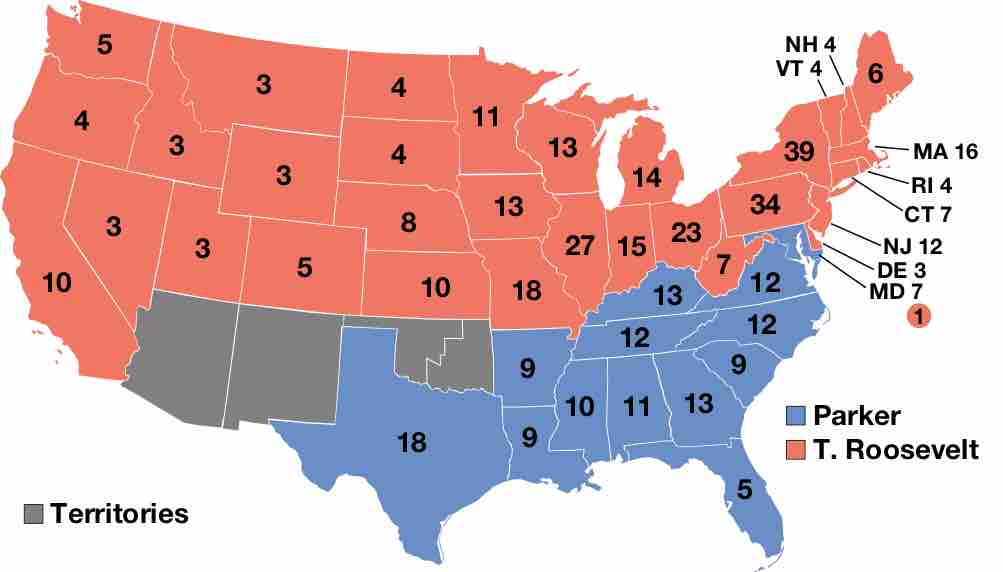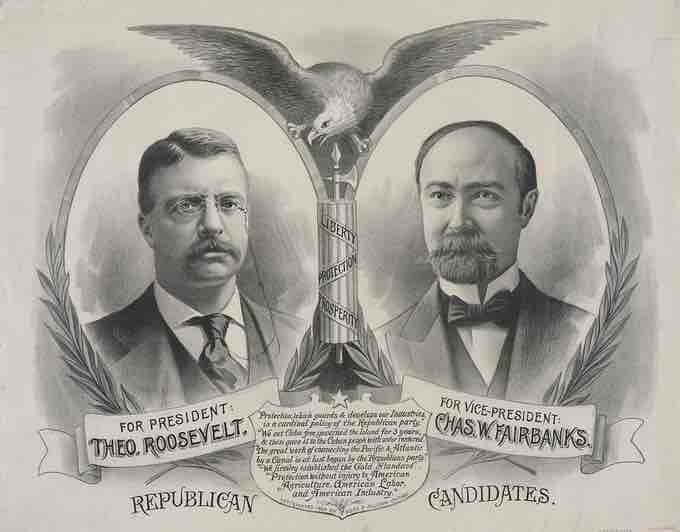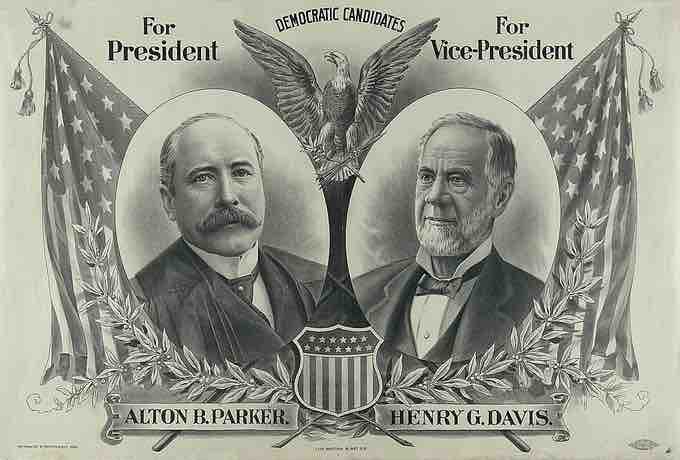The Election of 1904
Incumbent president and Republican candidate Theodore Roosevelt, having succeeded to the presidency upon the assassination of William McKinley in September 1901, was elected to a term in his own right during the election of 1904. During the election campaign, Republicans emphasized Roosevelt's success in foreign affairs and his record of firmness against monopolies. The nominee of the Democratic Party was Alton B. Parker, chief judge of the New York Court of Appeals. As there was little difference between the candidates' positions, the race largely was based on their personalities. Roosevelt easily defeated Parker, sweeping every region in the nation except the South. In doing so, he became the first incumbent president to win election to a term in his own right after having ascended to the presidency (from the vice presidency) upon the death of his predecessor.

Electoral College 1904
In this presidential-election results map, blue denotes states won by Parker/Davis, and red denotes states won by Roosevelt/Fairbanks. Numbers indicate electoral votes allotted to each state. Broadly speaking, Parker won all of the southern states including Texas, while Roosevelt won the Northeast, Midwest, and Pacific states.
The election of 1904 was significant because it was the first election in which the Socialist Party of America (a loose coalition of local parties) participated, with considerable success in industrial centers, in rural mining areas in the West, and among German and Finnish communities. The Socialists nominated Eugene Debs as their presidential candidate. The nominee of the Democratic Party, Alton B. Parker, called for an end to "the rule of individual caprice" and the "usurpation of authority" by president Roosevelt.
When the Republicans convened in Chicago June 21–23, 1904, Roosevelt's nomination was assured. Following the McKinley assassination, from 1902–1903, Roosevelt had effectively maneuvered into control of the Republican Party to ensure that he would have enough supporters to seek reelection. Earlier in the year, several republicans attempted to secure the candidacy of Senator Mark Hanna of Ohio, but Hanna's death a few months before the convention effectively removed any real opposition to Roosevelt's candidacy, and in the convention, he was nominated unanimously on the first ballot with 994 votes. The Republican platform insisted on maintaining the protective tariff, called for increased foreign trade, pledged to uphold the gold standard, favored expansion of the merchant marine, and promoted the development of a strong navy.

Roosevelt campaign poster
A Roosevelt/Fairbanks (Republican Party candidates) election campaign poster.
The Democratic platform, united behind Parker, called for a reduction in government expenditures, condemned monopolies, pledged an end to government contracts with companies violating antitrust laws, opposed imperialism, insisted on independence for the Philippines, and opposed the protective tariff. The Democrats favored strict enforcement of the eight-hour workday, construction of a Panama Canal, the direct election of senators, statehood for the western territories, cuts in the army's size and budget, and enforcement of the civil-service laws. Parker's campaign accused the Roosevelt administration of being, "spasmodic, erratic, sensational, spectacular, and arbitrary."

1904 Democratic poster
A Parker/Davis (Democratic Party candidates) election campaign poster.
Roosevelt won a landslide victory, taking every northern and western state, as well as Missouri (making him the first Republican to carry that state since 1868). He also won more than 2.5 million popular votes. Parker carried only 1,107 counties, a smaller number than any Democratic candidate in the Fourth Party System had carried except Al Smith in 1928. This poor performance prompted many contemporaries to believe that the Democratic Party could dissolve in the near future.